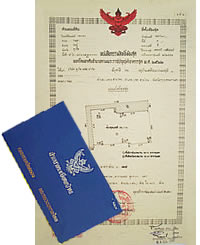
Q & A condominium and foreign ownership in Thailand


 ANSWER Every apartment unit in a registered condominium has an apartment unit title deed (issued by the Land Department) and a house registration (blue) book (issued by the local government). The most important document for ownership is the title deed (sample right). When ownership of an apartment is transferred the land office will change the owner's name on the owner's title deed and the owner's name in the land office registers.
ANSWER Every apartment unit in a registered condominium has an apartment unit title deed (issued by the Land Department) and a house registration (blue) book (issued by the local government). The most important document for ownership is the title deed (sample right). When ownership of an apartment is transferred the land office will change the owner's name on the owner's title deed and the owner's name in the land office registers.